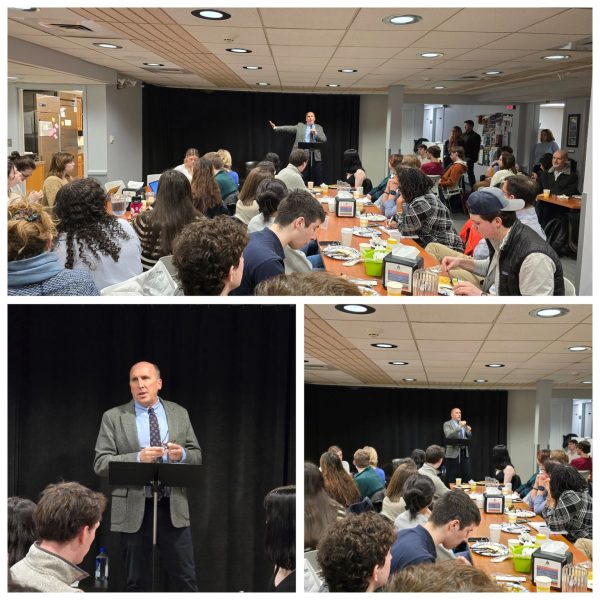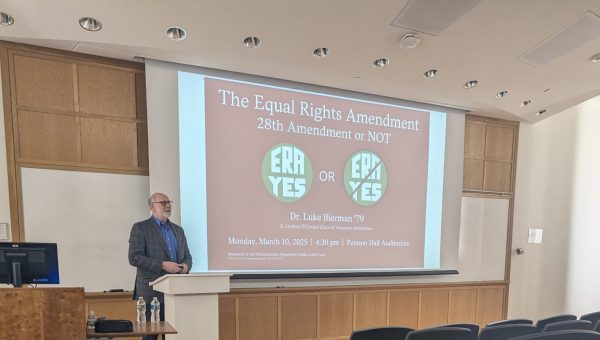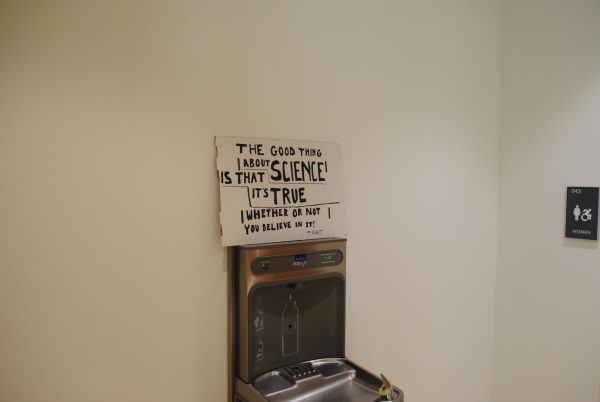Deal or No Deal?: Experts Debate the Iranian Nuclear Deal
Friday, September 11, 2015 marked the 14th anniversary of the terrorist attacks that destroyed the Twin Towers of New York City’s World Trade Center in 2001. In order to commemorate the event, the Center for Freedom and Western Civilization, led by Professor of Political Science and Director of the Center for Freedom and Western Civilization Robert Kraynak, and the Colgate International Relations Program, led by Harvey Picker Professor of International Relations and Director of the International Relations Program Fred Chernoff, hosted a debate titled “Iran and the Bomb: Assessing the Iranian Nuclear Deal.” The sponsors thought the debate would be a great way to highlight the importance of serious and honest discussion honoring the seven Colgate alumni who lost their lives on September 11, 2001.
“It is special that we’re doing this on the anniversary; this is the world we live in,” Robert Gallucci, the first panelist to speak at the debate, said.
Gallucci is a former U.S. Ambassador, Dean of the School of Foreign Service at Georgetown University and President of the MacArthur Foundation. He is currently a Distinguished Professor in the Practice of Diplomacy at Georgetown University. Gallucci received degrees from both the State University of New York at Stony Brook and Brandeis University.
Mark Dubowitz was the second expert panelist at the event. Dubowitz is a former venture capitalist and technology executive, and now holds the position of executive director of a nonpartisan policy institute, the Foundation for Defense of Democracies (FDD). At FDD, Dubowitz is an expert on Iran, sanctions and nonproliferation. He has received degrees from Johns Hopkins University and the University of Toronto.
After Kraynak introduced both panelists, Gallucci began with an unbiased, broad overview and explanation of what the Iran Deal entails.
“It provides for restrictions on Iran’s nuclear program in exchange for relief of sanctions,” Gallucci said.
These restrictions include prohibiting the enrichment of uranium by more than 3.67 percent for 15 years, as 50 percent enrichment is required to build nuclear weapons. But after 10 years, Iran can begin to do research. The deal also requires Iran to ship its plutonium out of the country, and Iran only gets 24-day warnings before inspections can take place, limiting their ability to hide any break in the deal.
“This is a deal I support. I support it because I don’t think we can get a better deal,” Gallucci said. However, Gallucci also cited several problems that he has with the current deal. He claimed that by allowing Iran to produce uranium it undermines the last 25 years during which the United States told the international community not to produce uranium unless it was economically profitable. Secondly, Gallucci doesn’t believe that there is enough transparency with this deal. Although Iran can’t hide much in 24 days, it could conceal cold testing or special research for triggering packages. Gallucci also wishes that some parts of the deal had been permanent, instead of limited to 15 years.
Dubowitz represented the opposing viewpoint and explained why he does not support this deal with Iran whatsoever. He claims that the deal is fundamentally flawed and that the United States settled for too many compromises.
“This is a bad deal because it is a ticking time bomb,” Dubowitz said.
Dubowitz criticized those who suggest that war is the alternative, claiming that the United States, by settling for this deal, is agreeing to war as well. The structure of the deal, including the five to 15 year sunset clauses, allows Iran’s nuclear program to expand while sanctions dissolve. He explained that after five years, the conventional arms embargo will disappear, allowing Iran to acquire sophisticated weaponry legally.
Dubowitz also discussed the possibility of this deal allowing Iran to support Khaled Asaad in his killing of Syrians, among other terrorist groups. After eight years, Iran would be able to buy the technology for an intercontinental ballistic missile (ICBM), and with the smaller number of centrifuges they are allowed to posses, they would, Dubowitz claimed, be easier to hide.
“I would rather have a weakened Iran today, than a strengthened Iran tomorrow,” Dubowitz said.
Dubowitz continued the discussion by saying that Iran needs this deal more than the U.S. does, since they are under extreme economic pressure. By giving in to their demands, the U.S. is helping to strengthen Iran and assisting in preparing them for war with both conventional and nuclear weapons.
Both panelists agreed that Iran’s nuclear program is definitely a nuclear weapons program, although Iran claims otherwise. With the lack of transparency, this program could continue with cold testing and other similar procedures. Iran also refuses to allow physical access to any military site, making tracking even more difficult.
Students who attended the event filled Persson Auditorium during the debate, all with differing opinions and reactions.
“This was one of the most informative events I have attended at Colgate,” junior Michael Hogg said. “Both speakers clearly were the best in their fields and agreed with each other more than once, which made the debate even more interesting when their opinions diverged.”
The students shared differing opinions on the Iranian deal and on the two different debaters.
“Mr. Gallucci had more prevalent experience creating and negotiating deals giving him more insight into the logistics of creating treaties, whereas Mr. Dubowitz focused more on lawyer negotiation tactics that assessed and responded to why the U.S. decided to make such a deal. However, I would argue that they did not adequately address the impact of such a deal on U.S. foreign policy in general as well as in the Middle East,” junior Katrina Stevenson said.
“Robert Gallucci supported the agreement because it has a clause that can be used to justify war. War, however, should not be our final option and this agreement does make war much more likely,” sophomore Matt DeLeo said.
General student sentiment in regard to the debate was positive.
“We are very lucky as Colgate students to have opportunities to interact with highly influential people from the policy world,” senior Adam
Basciano said.





